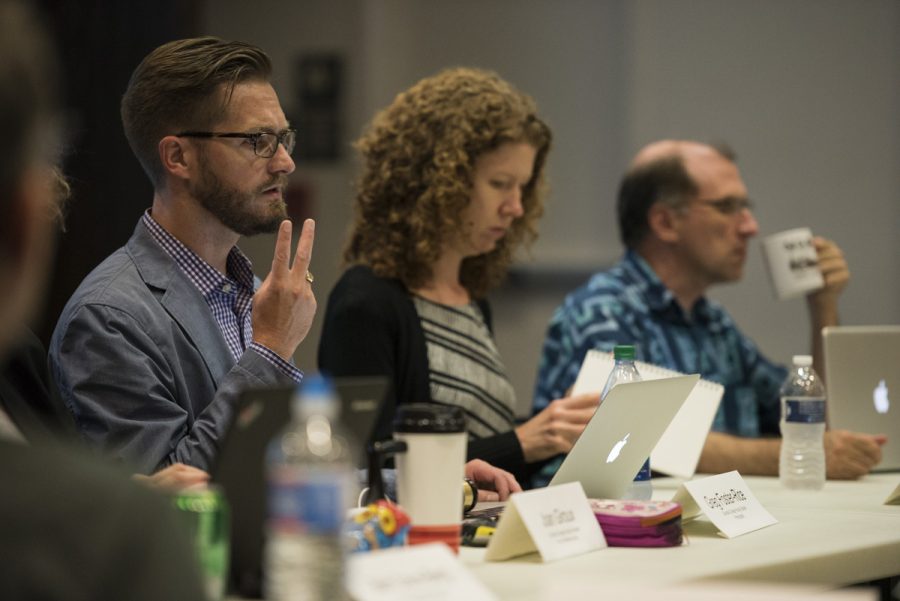Faculty Senate addresses ‘summer surprise’ decisions
Faculty pushed for budget transparency and consultation between the administration and faculty at Aug. 29 Faculty Senate meeting at Stage Two in 618 S. Michigan Ave. Building.
September 6, 2016
Faculty members called for greater inclusion in major decisions following the announcement of the Theatre and Dance departments’ merger during the first Faculty Senate meeting of the semester Aug. 29.
At the meeting, held at Stage Two in the 618 S. Michigan Ave. Building, several senators called the decision a “summer surprise” and pushed for new policies for the communication of administrative decisions.
The Senate asked for faculty consultation prior to announcing these decisions during the summer and disclosure of budgets to keep faculty aware of the financial state of their departments.
Before discussing the controversial merger announcement, as reported Aug. 25 by The Chronicle, Greg Foster-Rice, Faculty Senate chair and associate professor in the Photography Department, acknowledged the stress it caused faculty members in the Theatre and Dance departments.
Foster-Rice said the administrative merger, which made Dance Department chair Peter Carpenter head of both departments, was triggered by John Green’s announcement he was stepping down as chair of the Theatre Department. In a July 25 email sent to faculty, Green said he would return to the classroom and avoid the discomfort caused by addressing departmental layoffs.
“As far as I’ve been told, none of the theatre faculty had been made aware of his intentions until this email, so this was quite shocking,” Foster-Rice said.
Foster-Rice also said although the college cannot erase the sense of distrust created among faculty, it has made some positive steps by returning to procedures outlined in the faculty handbook and sharing more information with faculty.
The Theatre Department was specifically concerned by the failure to follow faculty handbook procedures and policies that require faculty consultation before these types of decisions, said Jacqueline Penrod, an associate professor in the Theatre Department.
“When this came down—like a ton of bricks—we were totally unprepared to lose our chair and to be told we were being put [in an] administrative unit with the Dance Department,” Penrod said.
She said the administration communicated this decision as a crisis but should have informed the faculty at least two years ago.
“That is not really acceptable,” Penrod said. “The idea of [making a decision] and then apologizing later—that should not be the way things are run.”
Penrod also expressed concern over who will make the decision to disband or continue the merger after a year and how to evaluate its success or failure.
She said both departments were asked to create larger 50–75-student classes, without any preparation, which hopefully will be ready by Fall 2017.
“We are very supportive of Peter,” Penrod said. “Our complaint is not with Peter—it is more with the process.”
Senior Vice President and Provost Stan Wearden said there could have been better communication between both parties regarding the Theatre and Dance departments’ merger but thinks there is an issue with faculty not being present during the summer break.
“It’s a little unusual to what I’m accustomed to where even when faculty aren’t teaching, they’re still around and in touch with the institution,” Wearden said. “If faculty were more engaged in the summer, that would help. If we were more communicative, that would help as well.”
Keith Kostecka, associate professor in the Science & Mathematics Department, suggested holding Executive Committee meetings with affected faculty and administration during the summer to discuss departmental issues. He also pushed for inclusion of a policy in the faculty handbook for consistency across the institution.
Eric Scholl, associate chair of the Television Department, said this decision reminds him of the creation of the Communication&Media Innovation Department, in which the merging of several departments surprised its new chair when announced.
“In these sorts of decisions there, should be no surprises,” Scholl said.
Wearden added he is scheduled to speak at the next Faculty Senate meeting Sept. 9 to talk about ways to improve communication between the administration and faculty.
He will also address the disclosure of departmental budgets. Wearden said he has shared budgets with department chairs and deans for two years, which he asked to distribute to faculty.
“We’re going to do things a little differently this year to make sure faculty get the information they need,” Wearden said.








